A Comparative Study of Ethics Training, Leadership, and Rewards
VerifiedAdded on 2020/03/04
|10
|3059
|63
Essay
AI Summary
This essay critically analyzes the effectiveness of formal ethics training programs in corporate settings, contrasting them with ethical leadership and reward systems. It explores whether such training is beneficial, examining the concept of "cosmetics" in relation to ethics training, suggesting that while training aims to instill moral principles, practical realities often differ. The essay discusses ethical leadership and rewards as alternatives, providing examples of companies like Mr. Bean Singapore and Singtel, and references frameworks like the 3P's model. It compares the impact of ethics training versus ethical leadership and reward systems, using examples like China Aviation Oil and successful companies such as Starbucks and Apple, highlighting the importance of transparency and customer relationships. The essay concludes by emphasizing the need for ethical leadership and rewards to maintain good employee performance, unbiased treatment, and to prevent issues like whistleblowing.
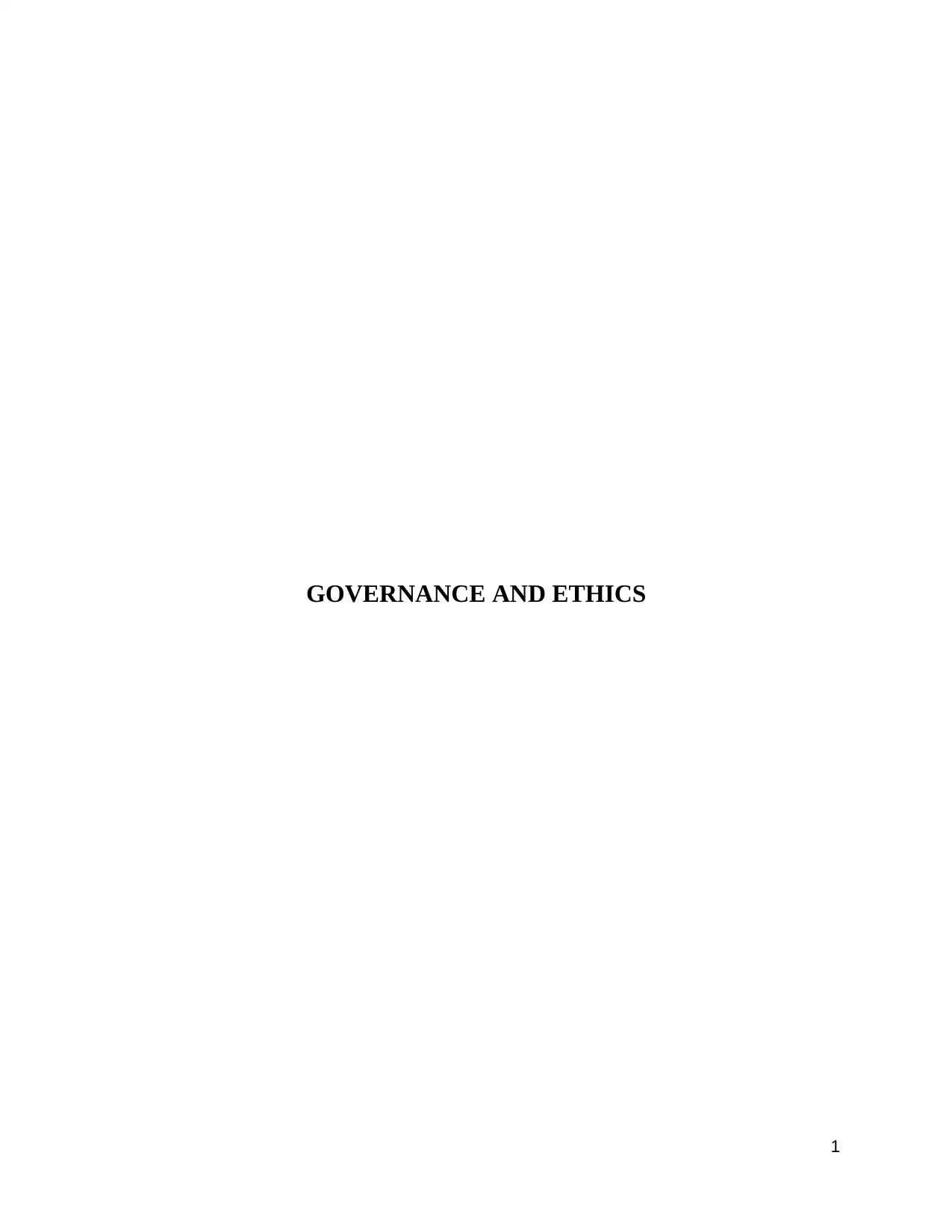
GOVERNANCE AND ETHICS
1
1
Paraphrase This Document
Need a fresh take? Get an instant paraphrase of this document with our AI Paraphraser
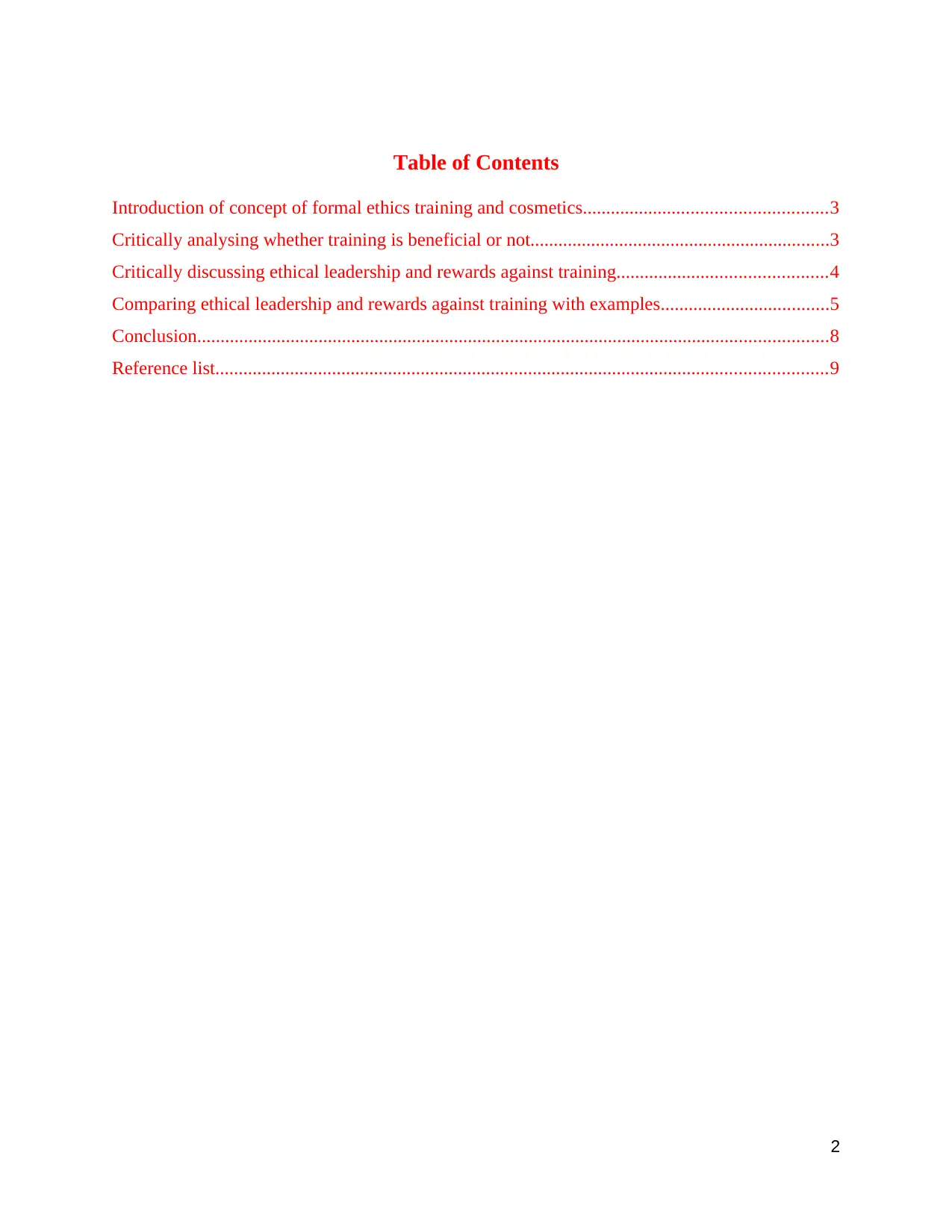
Table of Contents
Introduction of concept of formal ethics training and cosmetics....................................................3
Critically analysing whether training is beneficial or not................................................................3
Critically discussing ethical leadership and rewards against training.............................................4
Comparing ethical leadership and rewards against training with examples....................................5
Conclusion.......................................................................................................................................8
Reference list...................................................................................................................................9
2
Introduction of concept of formal ethics training and cosmetics....................................................3
Critically analysing whether training is beneficial or not................................................................3
Critically discussing ethical leadership and rewards against training.............................................4
Comparing ethical leadership and rewards against training with examples....................................5
Conclusion.......................................................................................................................................8
Reference list...................................................................................................................................9
2
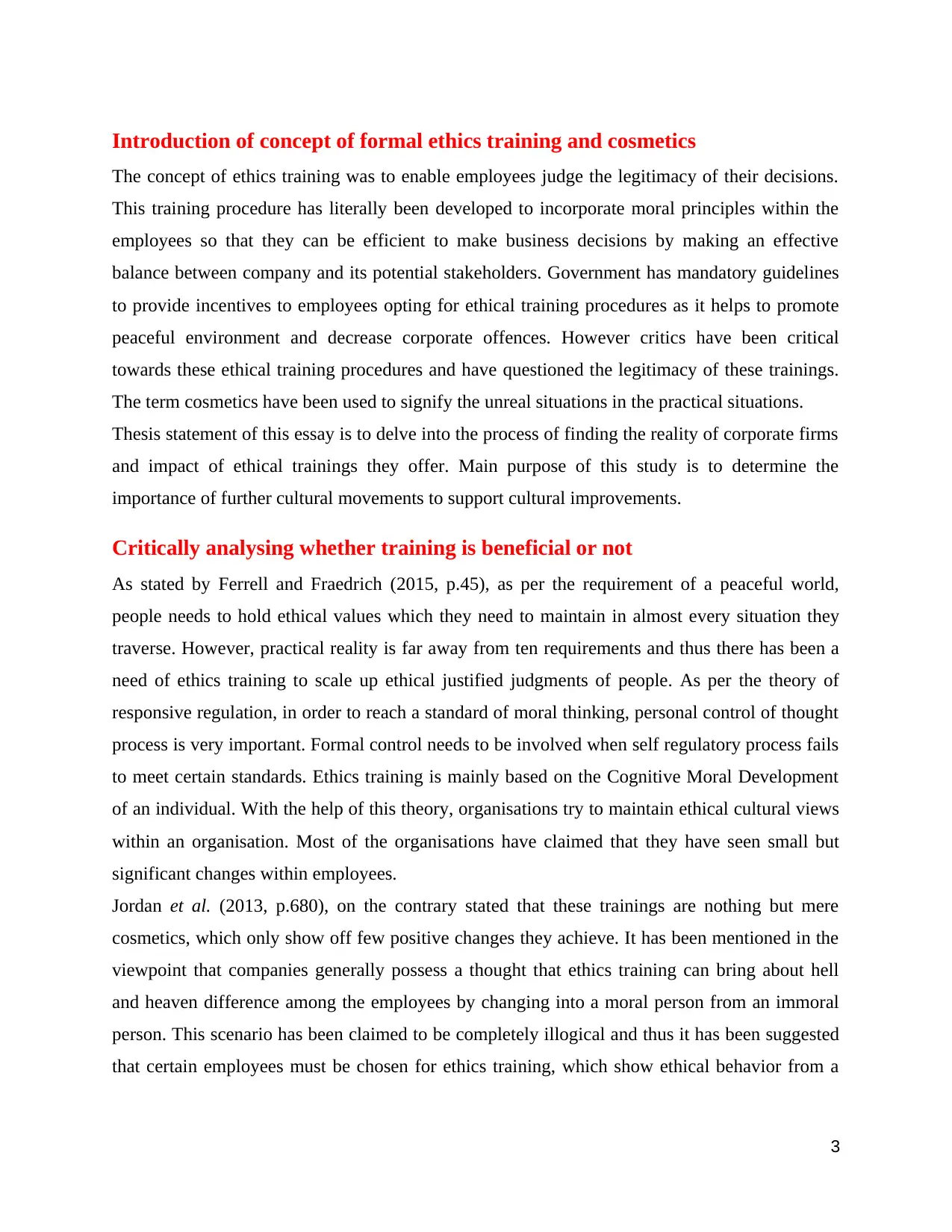
Introduction of concept of formal ethics training and cosmetics
The concept of ethics training was to enable employees judge the legitimacy of their decisions.
This training procedure has literally been developed to incorporate moral principles within the
employees so that they can be efficient to make business decisions by making an effective
balance between company and its potential stakeholders. Government has mandatory guidelines
to provide incentives to employees opting for ethical training procedures as it helps to promote
peaceful environment and decrease corporate offences. However critics have been critical
towards these ethical training procedures and have questioned the legitimacy of these trainings.
The term cosmetics have been used to signify the unreal situations in the practical situations.
Thesis statement of this essay is to delve into the process of finding the reality of corporate firms
and impact of ethical trainings they offer. Main purpose of this study is to determine the
importance of further cultural movements to support cultural improvements.
Critically analysing whether training is beneficial or not
As stated by Ferrell and Fraedrich (2015, p.45), as per the requirement of a peaceful world,
people needs to hold ethical values which they need to maintain in almost every situation they
traverse. However, practical reality is far away from ten requirements and thus there has been a
need of ethics training to scale up ethical justified judgments of people. As per the theory of
responsive regulation, in order to reach a standard of moral thinking, personal control of thought
process is very important. Formal control needs to be involved when self regulatory process fails
to meet certain standards. Ethics training is mainly based on the Cognitive Moral Development
of an individual. With the help of this theory, organisations try to maintain ethical cultural views
within an organisation. Most of the organisations have claimed that they have seen small but
significant changes within employees.
Jordan et al. (2013, p.680), on the contrary stated that these trainings are nothing but mere
cosmetics, which only show off few positive changes they achieve. It has been mentioned in the
viewpoint that companies generally possess a thought that ethics training can bring about hell
and heaven difference among the employees by changing into a moral person from an immoral
person. This scenario has been claimed to be completely illogical and thus it has been suggested
that certain employees must be chosen for ethics training, which show ethical behavior from a
3
The concept of ethics training was to enable employees judge the legitimacy of their decisions.
This training procedure has literally been developed to incorporate moral principles within the
employees so that they can be efficient to make business decisions by making an effective
balance between company and its potential stakeholders. Government has mandatory guidelines
to provide incentives to employees opting for ethical training procedures as it helps to promote
peaceful environment and decrease corporate offences. However critics have been critical
towards these ethical training procedures and have questioned the legitimacy of these trainings.
The term cosmetics have been used to signify the unreal situations in the practical situations.
Thesis statement of this essay is to delve into the process of finding the reality of corporate firms
and impact of ethical trainings they offer. Main purpose of this study is to determine the
importance of further cultural movements to support cultural improvements.
Critically analysing whether training is beneficial or not
As stated by Ferrell and Fraedrich (2015, p.45), as per the requirement of a peaceful world,
people needs to hold ethical values which they need to maintain in almost every situation they
traverse. However, practical reality is far away from ten requirements and thus there has been a
need of ethics training to scale up ethical justified judgments of people. As per the theory of
responsive regulation, in order to reach a standard of moral thinking, personal control of thought
process is very important. Formal control needs to be involved when self regulatory process fails
to meet certain standards. Ethics training is mainly based on the Cognitive Moral Development
of an individual. With the help of this theory, organisations try to maintain ethical cultural views
within an organisation. Most of the organisations have claimed that they have seen small but
significant changes within employees.
Jordan et al. (2013, p.680), on the contrary stated that these trainings are nothing but mere
cosmetics, which only show off few positive changes they achieve. It has been mentioned in the
viewpoint that companies generally possess a thought that ethics training can bring about hell
and heaven difference among the employees by changing into a moral person from an immoral
person. This scenario has been claimed to be completely illogical and thus it has been suggested
that certain employees must be chosen for ethics training, which show ethical behavior from a
3
⊘ This is a preview!⊘
Do you want full access?
Subscribe today to unlock all pages.

Trusted by 1+ million students worldwide
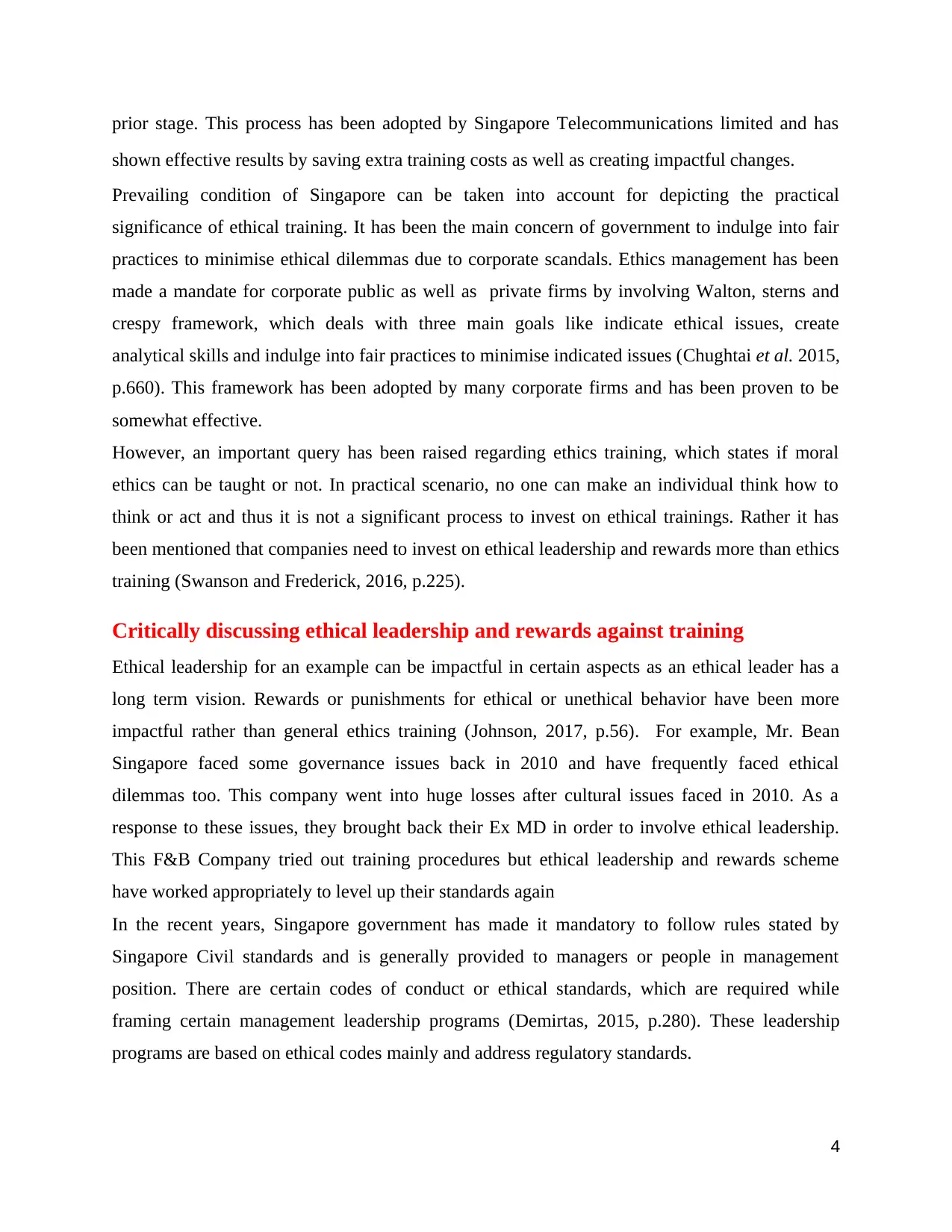
prior stage. This process has been adopted by Singapore Telecommunications limited and has
shown effective results by saving extra training costs as well as creating impactful changes.
Prevailing condition of Singapore can be taken into account for depicting the practical
significance of ethical training. It has been the main concern of government to indulge into fair
practices to minimise ethical dilemmas due to corporate scandals. Ethics management has been
made a mandate for corporate public as well as private firms by involving Walton, sterns and
crespy framework, which deals with three main goals like indicate ethical issues, create
analytical skills and indulge into fair practices to minimise indicated issues (Chughtai et al. 2015,
p.660). This framework has been adopted by many corporate firms and has been proven to be
somewhat effective.
However, an important query has been raised regarding ethics training, which states if moral
ethics can be taught or not. In practical scenario, no one can make an individual think how to
think or act and thus it is not a significant process to invest on ethical trainings. Rather it has
been mentioned that companies need to invest on ethical leadership and rewards more than ethics
training (Swanson and Frederick, 2016, p.225).
Critically discussing ethical leadership and rewards against training
Ethical leadership for an example can be impactful in certain aspects as an ethical leader has a
long term vision. Rewards or punishments for ethical or unethical behavior have been more
impactful rather than general ethics training (Johnson, 2017, p.56). For example, Mr. Bean
Singapore faced some governance issues back in 2010 and have frequently faced ethical
dilemmas too. This company went into huge losses after cultural issues faced in 2010. As a
response to these issues, they brought back their Ex MD in order to involve ethical leadership.
This F&B Company tried out training procedures but ethical leadership and rewards scheme
have worked appropriately to level up their standards again
In the recent years, Singapore government has made it mandatory to follow rules stated by
Singapore Civil standards and is generally provided to managers or people in management
position. There are certain codes of conduct or ethical standards, which are required while
framing certain management leadership programs (Demirtas, 2015, p.280). These leadership
programs are based on ethical codes mainly and address regulatory standards.
4
shown effective results by saving extra training costs as well as creating impactful changes.
Prevailing condition of Singapore can be taken into account for depicting the practical
significance of ethical training. It has been the main concern of government to indulge into fair
practices to minimise ethical dilemmas due to corporate scandals. Ethics management has been
made a mandate for corporate public as well as private firms by involving Walton, sterns and
crespy framework, which deals with three main goals like indicate ethical issues, create
analytical skills and indulge into fair practices to minimise indicated issues (Chughtai et al. 2015,
p.660). This framework has been adopted by many corporate firms and has been proven to be
somewhat effective.
However, an important query has been raised regarding ethics training, which states if moral
ethics can be taught or not. In practical scenario, no one can make an individual think how to
think or act and thus it is not a significant process to invest on ethical trainings. Rather it has
been mentioned that companies need to invest on ethical leadership and rewards more than ethics
training (Swanson and Frederick, 2016, p.225).
Critically discussing ethical leadership and rewards against training
Ethical leadership for an example can be impactful in certain aspects as an ethical leader has a
long term vision. Rewards or punishments for ethical or unethical behavior have been more
impactful rather than general ethics training (Johnson, 2017, p.56). For example, Mr. Bean
Singapore faced some governance issues back in 2010 and have frequently faced ethical
dilemmas too. This company went into huge losses after cultural issues faced in 2010. As a
response to these issues, they brought back their Ex MD in order to involve ethical leadership.
This F&B Company tried out training procedures but ethical leadership and rewards scheme
have worked appropriately to level up their standards again
In the recent years, Singapore government has made it mandatory to follow rules stated by
Singapore Civil standards and is generally provided to managers or people in management
position. There are certain codes of conduct or ethical standards, which are required while
framing certain management leadership programs (Demirtas, 2015, p.280). These leadership
programs are based on ethical codes mainly and address regulatory standards.
4
Paraphrase This Document
Need a fresh take? Get an instant paraphrase of this document with our AI Paraphraser
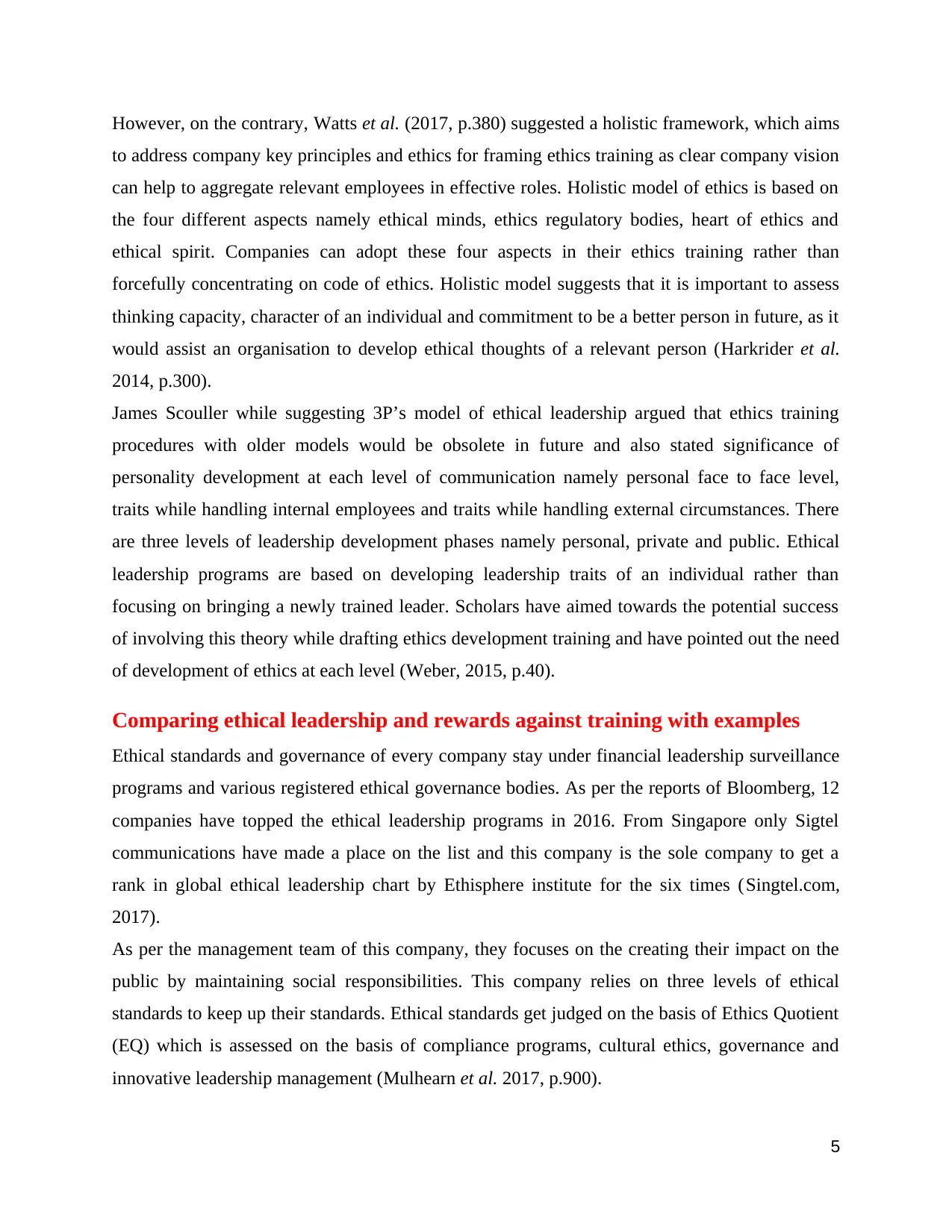
However, on the contrary, Watts et al. (2017, p.380) suggested a holistic framework, which aims
to address company key principles and ethics for framing ethics training as clear company vision
can help to aggregate relevant employees in effective roles. Holistic model of ethics is based on
the four different aspects namely ethical minds, ethics regulatory bodies, heart of ethics and
ethical spirit. Companies can adopt these four aspects in their ethics training rather than
forcefully concentrating on code of ethics. Holistic model suggests that it is important to assess
thinking capacity, character of an individual and commitment to be a better person in future, as it
would assist an organisation to develop ethical thoughts of a relevant person (Harkrider et al.
2014, p.300).
James Scouller while suggesting 3P’s model of ethical leadership argued that ethics training
procedures with older models would be obsolete in future and also stated significance of
personality development at each level of communication namely personal face to face level,
traits while handling internal employees and traits while handling external circumstances. There
are three levels of leadership development phases namely personal, private and public. Ethical
leadership programs are based on developing leadership traits of an individual rather than
focusing on bringing a newly trained leader. Scholars have aimed towards the potential success
of involving this theory while drafting ethics development training and have pointed out the need
of development of ethics at each level (Weber, 2015, p.40).
Comparing ethical leadership and rewards against training with examples
Ethical standards and governance of every company stay under financial leadership surveillance
programs and various registered ethical governance bodies. As per the reports of Bloomberg, 12
companies have topped the ethical leadership programs in 2016. From Singapore only Sigtel
communications have made a place on the list and this company is the sole company to get a
rank in global ethical leadership chart by Ethisphere institute for the six times (Singtel.com,
2017).
As per the management team of this company, they focuses on the creating their impact on the
public by maintaining social responsibilities. This company relies on three levels of ethical
standards to keep up their standards. Ethical standards get judged on the basis of Ethics Quotient
(EQ) which is assessed on the basis of compliance programs, cultural ethics, governance and
innovative leadership management (Mulhearn et al. 2017, p.900).
5
to address company key principles and ethics for framing ethics training as clear company vision
can help to aggregate relevant employees in effective roles. Holistic model of ethics is based on
the four different aspects namely ethical minds, ethics regulatory bodies, heart of ethics and
ethical spirit. Companies can adopt these four aspects in their ethics training rather than
forcefully concentrating on code of ethics. Holistic model suggests that it is important to assess
thinking capacity, character of an individual and commitment to be a better person in future, as it
would assist an organisation to develop ethical thoughts of a relevant person (Harkrider et al.
2014, p.300).
James Scouller while suggesting 3P’s model of ethical leadership argued that ethics training
procedures with older models would be obsolete in future and also stated significance of
personality development at each level of communication namely personal face to face level,
traits while handling internal employees and traits while handling external circumstances. There
are three levels of leadership development phases namely personal, private and public. Ethical
leadership programs are based on developing leadership traits of an individual rather than
focusing on bringing a newly trained leader. Scholars have aimed towards the potential success
of involving this theory while drafting ethics development training and have pointed out the need
of development of ethics at each level (Weber, 2015, p.40).
Comparing ethical leadership and rewards against training with examples
Ethical standards and governance of every company stay under financial leadership surveillance
programs and various registered ethical governance bodies. As per the reports of Bloomberg, 12
companies have topped the ethical leadership programs in 2016. From Singapore only Sigtel
communications have made a place on the list and this company is the sole company to get a
rank in global ethical leadership chart by Ethisphere institute for the six times (Singtel.com,
2017).
As per the management team of this company, they focuses on the creating their impact on the
public by maintaining social responsibilities. This company relies on three levels of ethical
standards to keep up their standards. Ethical standards get judged on the basis of Ethics Quotient
(EQ) which is assessed on the basis of compliance programs, cultural ethics, governance and
innovative leadership management (Mulhearn et al. 2017, p.900).
5
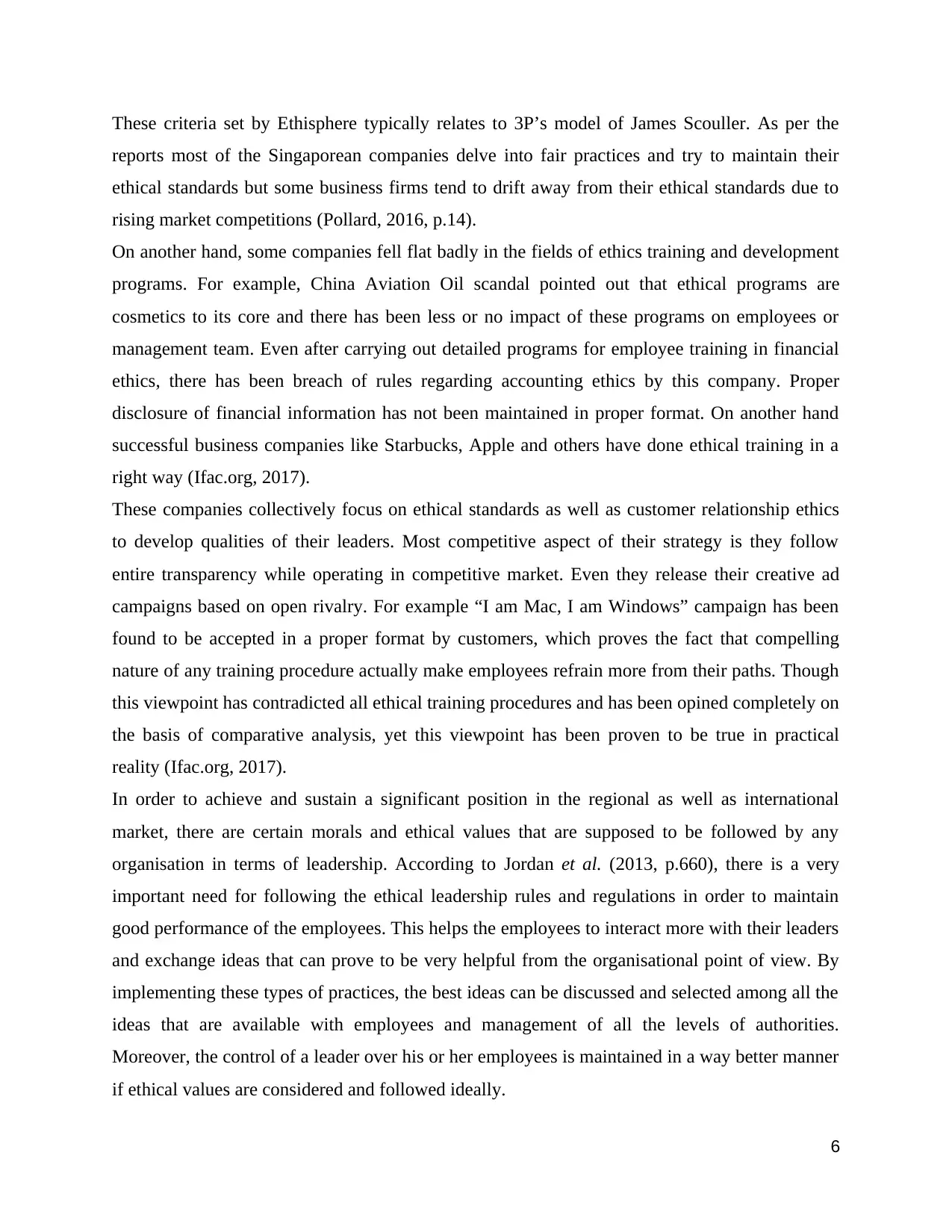
These criteria set by Ethisphere typically relates to 3P’s model of James Scouller. As per the
reports most of the Singaporean companies delve into fair practices and try to maintain their
ethical standards but some business firms tend to drift away from their ethical standards due to
rising market competitions (Pollard, 2016, p.14).
On another hand, some companies fell flat badly in the fields of ethics training and development
programs. For example, China Aviation Oil scandal pointed out that ethical programs are
cosmetics to its core and there has been less or no impact of these programs on employees or
management team. Even after carrying out detailed programs for employee training in financial
ethics, there has been breach of rules regarding accounting ethics by this company. Proper
disclosure of financial information has not been maintained in proper format. On another hand
successful business companies like Starbucks, Apple and others have done ethical training in a
right way (Ifac.org, 2017).
These companies collectively focus on ethical standards as well as customer relationship ethics
to develop qualities of their leaders. Most competitive aspect of their strategy is they follow
entire transparency while operating in competitive market. Even they release their creative ad
campaigns based on open rivalry. For example “I am Mac, I am Windows” campaign has been
found to be accepted in a proper format by customers, which proves the fact that compelling
nature of any training procedure actually make employees refrain more from their paths. Though
this viewpoint has contradicted all ethical training procedures and has been opined completely on
the basis of comparative analysis, yet this viewpoint has been proven to be true in practical
reality (Ifac.org, 2017).
In order to achieve and sustain a significant position in the regional as well as international
market, there are certain morals and ethical values that are supposed to be followed by any
organisation in terms of leadership. According to Jordan et al. (2013, p.660), there is a very
important need for following the ethical leadership rules and regulations in order to maintain
good performance of the employees. This helps the employees to interact more with their leaders
and exchange ideas that can prove to be very helpful from the organisational point of view. By
implementing these types of practices, the best ideas can be discussed and selected among all the
ideas that are available with employees and management of all the levels of authorities.
Moreover, the control of a leader over his or her employees is maintained in a way better manner
if ethical values are considered and followed ideally.
6
reports most of the Singaporean companies delve into fair practices and try to maintain their
ethical standards but some business firms tend to drift away from their ethical standards due to
rising market competitions (Pollard, 2016, p.14).
On another hand, some companies fell flat badly in the fields of ethics training and development
programs. For example, China Aviation Oil scandal pointed out that ethical programs are
cosmetics to its core and there has been less or no impact of these programs on employees or
management team. Even after carrying out detailed programs for employee training in financial
ethics, there has been breach of rules regarding accounting ethics by this company. Proper
disclosure of financial information has not been maintained in proper format. On another hand
successful business companies like Starbucks, Apple and others have done ethical training in a
right way (Ifac.org, 2017).
These companies collectively focus on ethical standards as well as customer relationship ethics
to develop qualities of their leaders. Most competitive aspect of their strategy is they follow
entire transparency while operating in competitive market. Even they release their creative ad
campaigns based on open rivalry. For example “I am Mac, I am Windows” campaign has been
found to be accepted in a proper format by customers, which proves the fact that compelling
nature of any training procedure actually make employees refrain more from their paths. Though
this viewpoint has contradicted all ethical training procedures and has been opined completely on
the basis of comparative analysis, yet this viewpoint has been proven to be true in practical
reality (Ifac.org, 2017).
In order to achieve and sustain a significant position in the regional as well as international
market, there are certain morals and ethical values that are supposed to be followed by any
organisation in terms of leadership. According to Jordan et al. (2013, p.660), there is a very
important need for following the ethical leadership rules and regulations in order to maintain
good performance of the employees. This helps the employees to interact more with their leaders
and exchange ideas that can prove to be very helpful from the organisational point of view. By
implementing these types of practices, the best ideas can be discussed and selected among all the
ideas that are available with employees and management of all the levels of authorities.
Moreover, the control of a leader over his or her employees is maintained in a way better manner
if ethical values are considered and followed ideally.
6
⊘ This is a preview!⊘
Do you want full access?
Subscribe today to unlock all pages.

Trusted by 1+ million students worldwide
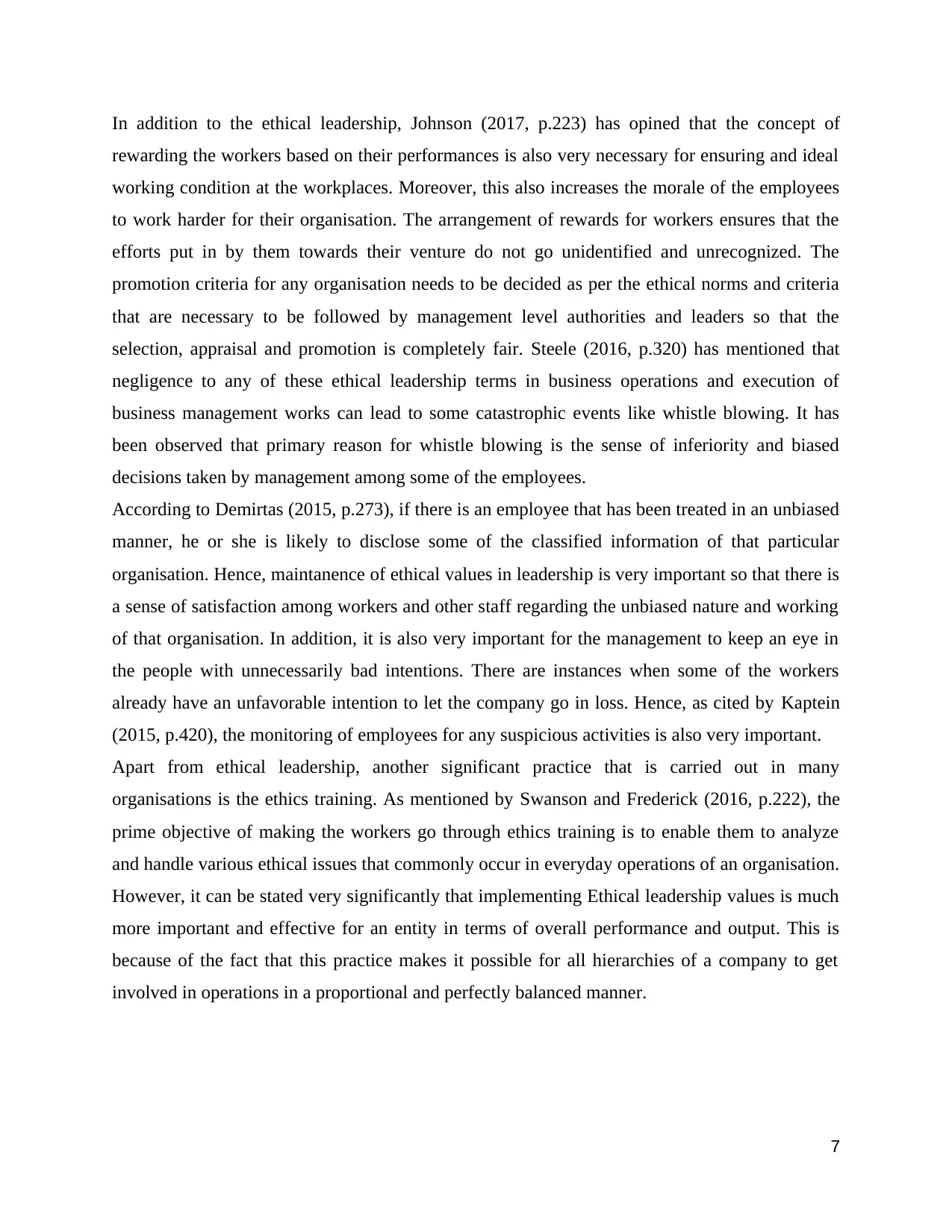
In addition to the ethical leadership, Johnson (2017, p.223) has opined that the concept of
rewarding the workers based on their performances is also very necessary for ensuring and ideal
working condition at the workplaces. Moreover, this also increases the morale of the employees
to work harder for their organisation. The arrangement of rewards for workers ensures that the
efforts put in by them towards their venture do not go unidentified and unrecognized. The
promotion criteria for any organisation needs to be decided as per the ethical norms and criteria
that are necessary to be followed by management level authorities and leaders so that the
selection, appraisal and promotion is completely fair. Steele (2016, p.320) has mentioned that
negligence to any of these ethical leadership terms in business operations and execution of
business management works can lead to some catastrophic events like whistle blowing. It has
been observed that primary reason for whistle blowing is the sense of inferiority and biased
decisions taken by management among some of the employees.
According to Demirtas (2015, p.273), if there is an employee that has been treated in an unbiased
manner, he or she is likely to disclose some of the classified information of that particular
organisation. Hence, maintanence of ethical values in leadership is very important so that there is
a sense of satisfaction among workers and other staff regarding the unbiased nature and working
of that organisation. In addition, it is also very important for the management to keep an eye in
the people with unnecessarily bad intentions. There are instances when some of the workers
already have an unfavorable intention to let the company go in loss. Hence, as cited by Kaptein
(2015, p.420), the monitoring of employees for any suspicious activities is also very important.
Apart from ethical leadership, another significant practice that is carried out in many
organisations is the ethics training. As mentioned by Swanson and Frederick (2016, p.222), the
prime objective of making the workers go through ethics training is to enable them to analyze
and handle various ethical issues that commonly occur in everyday operations of an organisation.
However, it can be stated very significantly that implementing Ethical leadership values is much
more important and effective for an entity in terms of overall performance and output. This is
because of the fact that this practice makes it possible for all hierarchies of a company to get
involved in operations in a proportional and perfectly balanced manner.
7
rewarding the workers based on their performances is also very necessary for ensuring and ideal
working condition at the workplaces. Moreover, this also increases the morale of the employees
to work harder for their organisation. The arrangement of rewards for workers ensures that the
efforts put in by them towards their venture do not go unidentified and unrecognized. The
promotion criteria for any organisation needs to be decided as per the ethical norms and criteria
that are necessary to be followed by management level authorities and leaders so that the
selection, appraisal and promotion is completely fair. Steele (2016, p.320) has mentioned that
negligence to any of these ethical leadership terms in business operations and execution of
business management works can lead to some catastrophic events like whistle blowing. It has
been observed that primary reason for whistle blowing is the sense of inferiority and biased
decisions taken by management among some of the employees.
According to Demirtas (2015, p.273), if there is an employee that has been treated in an unbiased
manner, he or she is likely to disclose some of the classified information of that particular
organisation. Hence, maintanence of ethical values in leadership is very important so that there is
a sense of satisfaction among workers and other staff regarding the unbiased nature and working
of that organisation. In addition, it is also very important for the management to keep an eye in
the people with unnecessarily bad intentions. There are instances when some of the workers
already have an unfavorable intention to let the company go in loss. Hence, as cited by Kaptein
(2015, p.420), the monitoring of employees for any suspicious activities is also very important.
Apart from ethical leadership, another significant practice that is carried out in many
organisations is the ethics training. As mentioned by Swanson and Frederick (2016, p.222), the
prime objective of making the workers go through ethics training is to enable them to analyze
and handle various ethical issues that commonly occur in everyday operations of an organisation.
However, it can be stated very significantly that implementing Ethical leadership values is much
more important and effective for an entity in terms of overall performance and output. This is
because of the fact that this practice makes it possible for all hierarchies of a company to get
involved in operations in a proportional and perfectly balanced manner.
7
Paraphrase This Document
Need a fresh take? Get an instant paraphrase of this document with our AI Paraphraser
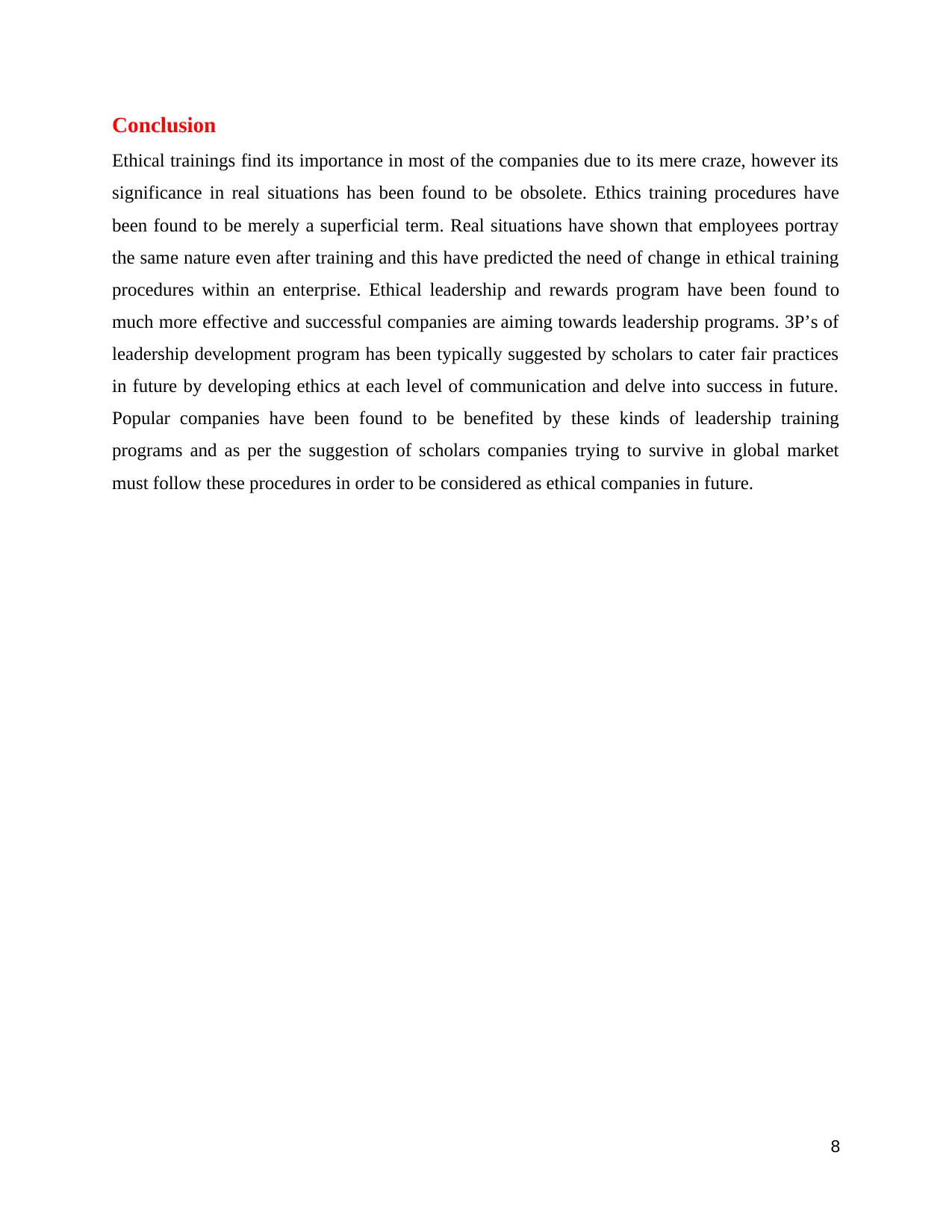
Conclusion
Ethical trainings find its importance in most of the companies due to its mere craze, however its
significance in real situations has been found to be obsolete. Ethics training procedures have
been found to be merely a superficial term. Real situations have shown that employees portray
the same nature even after training and this have predicted the need of change in ethical training
procedures within an enterprise. Ethical leadership and rewards program have been found to
much more effective and successful companies are aiming towards leadership programs. 3P’s of
leadership development program has been typically suggested by scholars to cater fair practices
in future by developing ethics at each level of communication and delve into success in future.
Popular companies have been found to be benefited by these kinds of leadership training
programs and as per the suggestion of scholars companies trying to survive in global market
must follow these procedures in order to be considered as ethical companies in future.
8
Ethical trainings find its importance in most of the companies due to its mere craze, however its
significance in real situations has been found to be obsolete. Ethics training procedures have
been found to be merely a superficial term. Real situations have shown that employees portray
the same nature even after training and this have predicted the need of change in ethical training
procedures within an enterprise. Ethical leadership and rewards program have been found to
much more effective and successful companies are aiming towards leadership programs. 3P’s of
leadership development program has been typically suggested by scholars to cater fair practices
in future by developing ethics at each level of communication and delve into success in future.
Popular companies have been found to be benefited by these kinds of leadership training
programs and as per the suggestion of scholars companies trying to survive in global market
must follow these procedures in order to be considered as ethical companies in future.
8
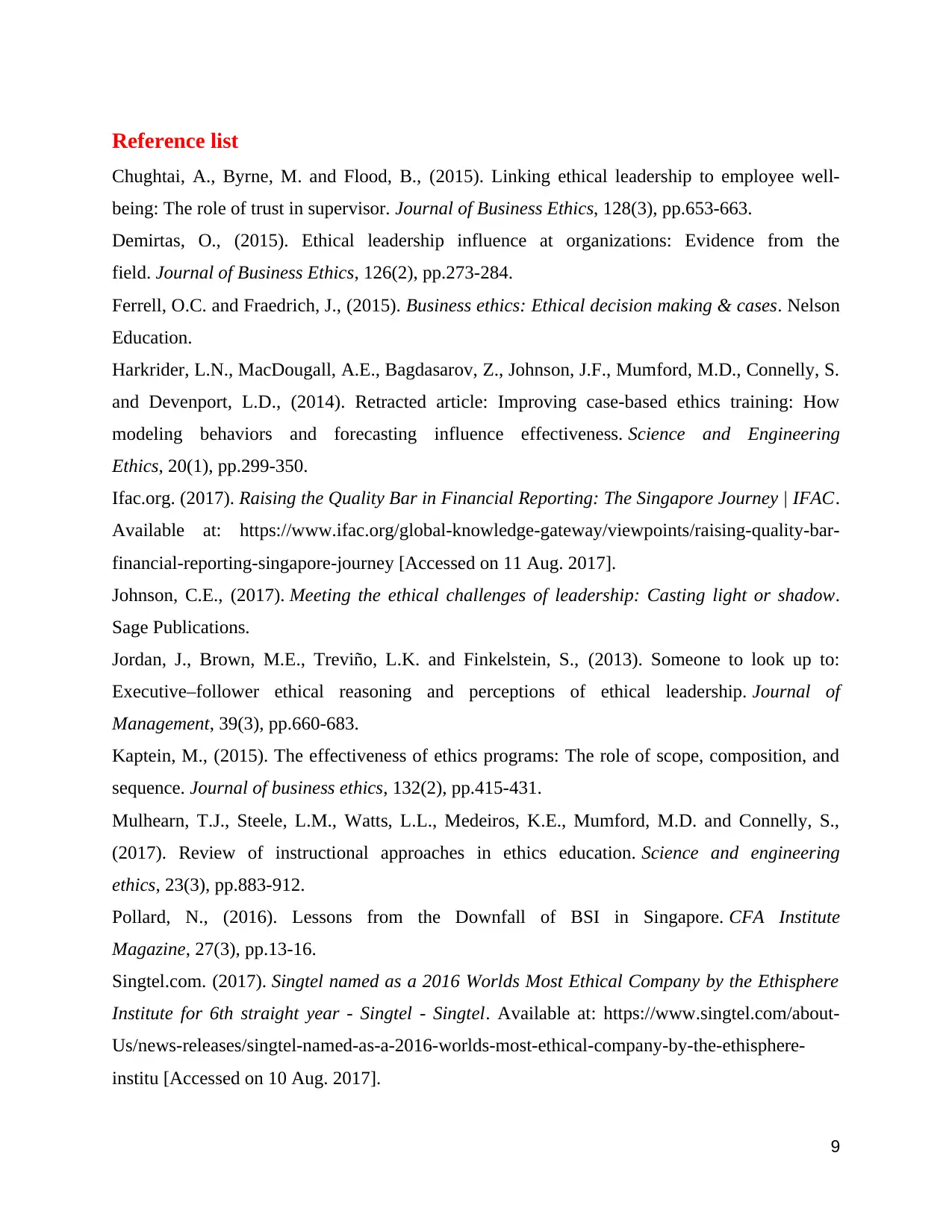
Reference list
Chughtai, A., Byrne, M. and Flood, B., (2015). Linking ethical leadership to employee well-
being: The role of trust in supervisor. Journal of Business Ethics, 128(3), pp.653-663.
Demirtas, O., (2015). Ethical leadership influence at organizations: Evidence from the
field. Journal of Business Ethics, 126(2), pp.273-284.
Ferrell, O.C. and Fraedrich, J., (2015). Business ethics: Ethical decision making & cases. Nelson
Education.
Harkrider, L.N., MacDougall, A.E., Bagdasarov, Z., Johnson, J.F., Mumford, M.D., Connelly, S.
and Devenport, L.D., (2014). Retracted article: Improving case-based ethics training: How
modeling behaviors and forecasting influence effectiveness. Science and Engineering
Ethics, 20(1), pp.299-350.
Ifac.org. (2017). Raising the Quality Bar in Financial Reporting: The Singapore Journey | IFAC.
Available at: https://www.ifac.org/global-knowledge-gateway/viewpoints/raising-quality-bar-
financial-reporting-singapore-journey [Accessed on 11 Aug. 2017].
Johnson, C.E., (2017). Meeting the ethical challenges of leadership: Casting light or shadow.
Sage Publications.
Jordan, J., Brown, M.E., Treviño, L.K. and Finkelstein, S., (2013). Someone to look up to:
Executive–follower ethical reasoning and perceptions of ethical leadership. Journal of
Management, 39(3), pp.660-683.
Kaptein, M., (2015). The effectiveness of ethics programs: The role of scope, composition, and
sequence. Journal of business ethics, 132(2), pp.415-431.
Mulhearn, T.J., Steele, L.M., Watts, L.L., Medeiros, K.E., Mumford, M.D. and Connelly, S.,
(2017). Review of instructional approaches in ethics education. Science and engineering
ethics, 23(3), pp.883-912.
Pollard, N., (2016). Lessons from the Downfall of BSI in Singapore. CFA Institute
Magazine, 27(3), pp.13-16.
Singtel.com. (2017). Singtel named as a 2016 Worlds Most Ethical Company by the Ethisphere
Institute for 6th straight year - Singtel - Singtel. Available at: https://www.singtel.com/about-
Us/news-releases/singtel-named-as-a-2016-worlds-most-ethical-company-by-the-ethisphere-
institu [Accessed on 10 Aug. 2017].
9
Chughtai, A., Byrne, M. and Flood, B., (2015). Linking ethical leadership to employee well-
being: The role of trust in supervisor. Journal of Business Ethics, 128(3), pp.653-663.
Demirtas, O., (2015). Ethical leadership influence at organizations: Evidence from the
field. Journal of Business Ethics, 126(2), pp.273-284.
Ferrell, O.C. and Fraedrich, J., (2015). Business ethics: Ethical decision making & cases. Nelson
Education.
Harkrider, L.N., MacDougall, A.E., Bagdasarov, Z., Johnson, J.F., Mumford, M.D., Connelly, S.
and Devenport, L.D., (2014). Retracted article: Improving case-based ethics training: How
modeling behaviors and forecasting influence effectiveness. Science and Engineering
Ethics, 20(1), pp.299-350.
Ifac.org. (2017). Raising the Quality Bar in Financial Reporting: The Singapore Journey | IFAC.
Available at: https://www.ifac.org/global-knowledge-gateway/viewpoints/raising-quality-bar-
financial-reporting-singapore-journey [Accessed on 11 Aug. 2017].
Johnson, C.E., (2017). Meeting the ethical challenges of leadership: Casting light or shadow.
Sage Publications.
Jordan, J., Brown, M.E., Treviño, L.K. and Finkelstein, S., (2013). Someone to look up to:
Executive–follower ethical reasoning and perceptions of ethical leadership. Journal of
Management, 39(3), pp.660-683.
Kaptein, M., (2015). The effectiveness of ethics programs: The role of scope, composition, and
sequence. Journal of business ethics, 132(2), pp.415-431.
Mulhearn, T.J., Steele, L.M., Watts, L.L., Medeiros, K.E., Mumford, M.D. and Connelly, S.,
(2017). Review of instructional approaches in ethics education. Science and engineering
ethics, 23(3), pp.883-912.
Pollard, N., (2016). Lessons from the Downfall of BSI in Singapore. CFA Institute
Magazine, 27(3), pp.13-16.
Singtel.com. (2017). Singtel named as a 2016 Worlds Most Ethical Company by the Ethisphere
Institute for 6th straight year - Singtel - Singtel. Available at: https://www.singtel.com/about-
Us/news-releases/singtel-named-as-a-2016-worlds-most-ethical-company-by-the-ethisphere-
institu [Accessed on 10 Aug. 2017].
9
⊘ This is a preview!⊘
Do you want full access?
Subscribe today to unlock all pages.

Trusted by 1+ million students worldwide
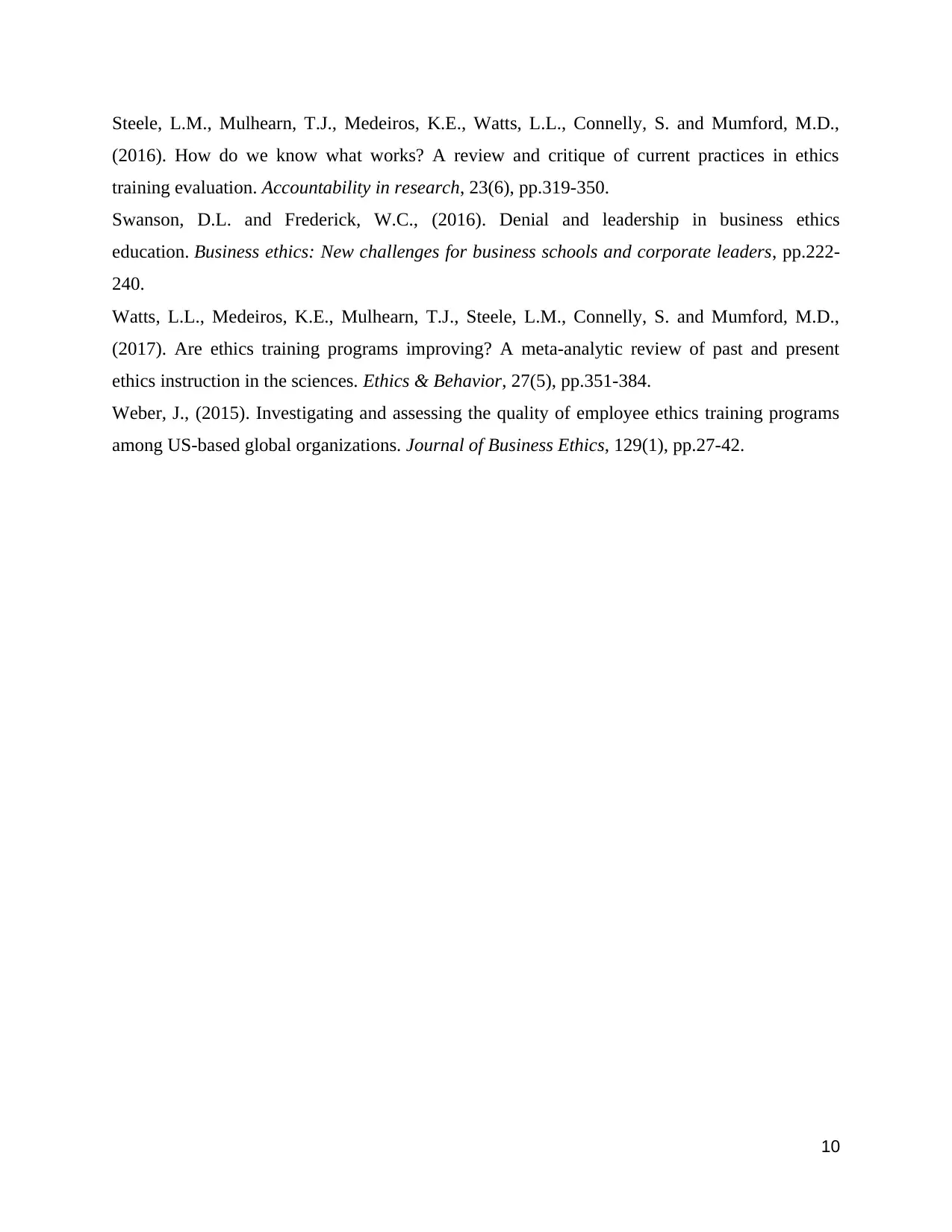
Steele, L.M., Mulhearn, T.J., Medeiros, K.E., Watts, L.L., Connelly, S. and Mumford, M.D.,
(2016). How do we know what works? A review and critique of current practices in ethics
training evaluation. Accountability in research, 23(6), pp.319-350.
Swanson, D.L. and Frederick, W.C., (2016). Denial and leadership in business ethics
education. Business ethics: New challenges for business schools and corporate leaders, pp.222-
240.
Watts, L.L., Medeiros, K.E., Mulhearn, T.J., Steele, L.M., Connelly, S. and Mumford, M.D.,
(2017). Are ethics training programs improving? A meta-analytic review of past and present
ethics instruction in the sciences. Ethics & Behavior, 27(5), pp.351-384.
Weber, J., (2015). Investigating and assessing the quality of employee ethics training programs
among US-based global organizations. Journal of Business Ethics, 129(1), pp.27-42.
10
(2016). How do we know what works? A review and critique of current practices in ethics
training evaluation. Accountability in research, 23(6), pp.319-350.
Swanson, D.L. and Frederick, W.C., (2016). Denial and leadership in business ethics
education. Business ethics: New challenges for business schools and corporate leaders, pp.222-
240.
Watts, L.L., Medeiros, K.E., Mulhearn, T.J., Steele, L.M., Connelly, S. and Mumford, M.D.,
(2017). Are ethics training programs improving? A meta-analytic review of past and present
ethics instruction in the sciences. Ethics & Behavior, 27(5), pp.351-384.
Weber, J., (2015). Investigating and assessing the quality of employee ethics training programs
among US-based global organizations. Journal of Business Ethics, 129(1), pp.27-42.
10
1 out of 10
Related Documents
Your All-in-One AI-Powered Toolkit for Academic Success.
+13062052269
info@desklib.com
Available 24*7 on WhatsApp / Email
![[object Object]](/_next/static/media/star-bottom.7253800d.svg)
Unlock your academic potential
Copyright © 2020–2025 A2Z Services. All Rights Reserved. Developed and managed by ZUCOL.





